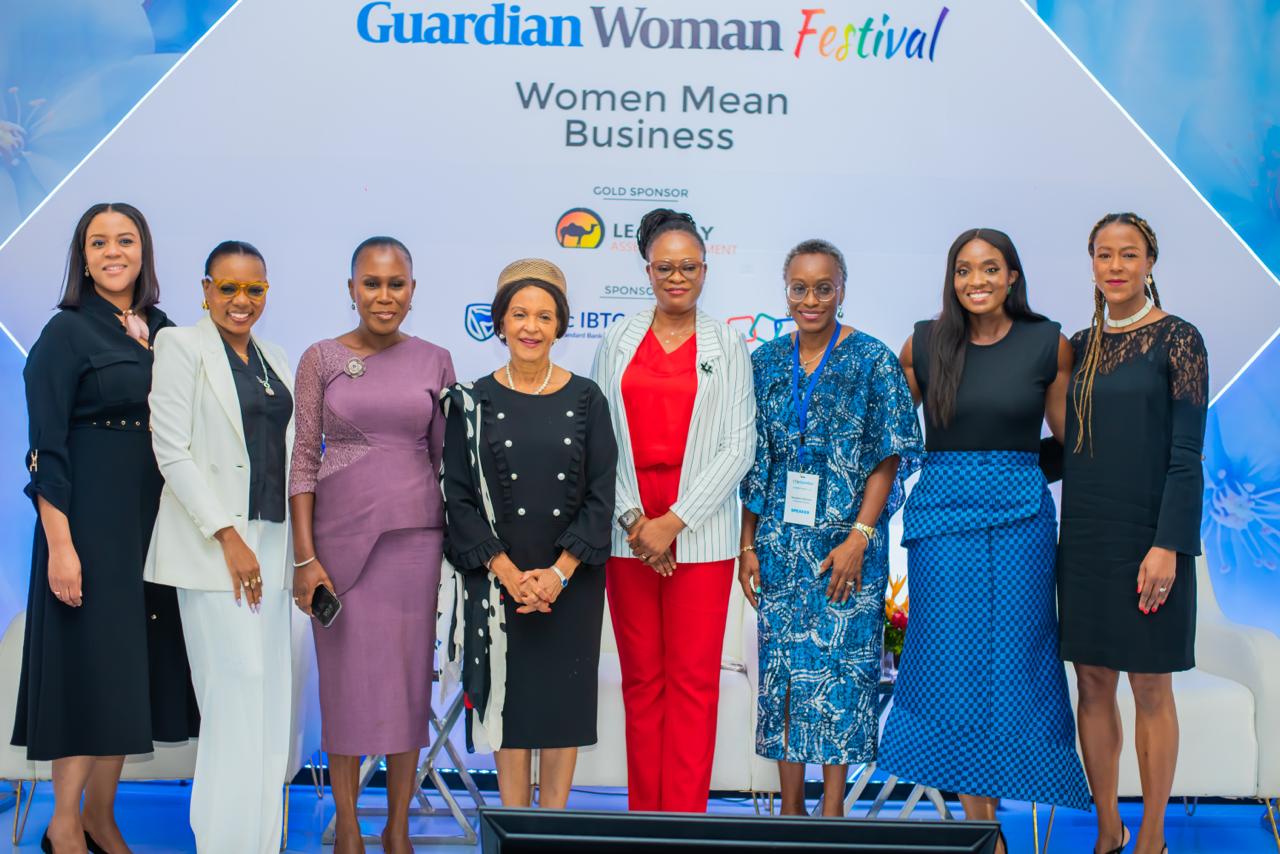 From the early hours, the venue buzzed with excitement as attendees exchanged warm greetings, some reconnecting with familiar faces while others forged new connections. The air carried a mix of soft laughter and the rhythmic hum of background music, setting a tone of both celebration and inspiration. Every detail, from the arrangements to the carefully designed stage, spoke of meticulous planning. The venue wore a true reflection of the power and grace of womanhood. The elegantly dressed women exuded confidence and purpose.
From the early hours, the venue buzzed with excitement as attendees exchanged warm greetings, some reconnecting with familiar faces while others forged new connections. The air carried a mix of soft laughter and the rhythmic hum of background music, setting a tone of both celebration and inspiration. Every detail, from the arrangements to the carefully designed stage, spoke of meticulous planning. The venue wore a true reflection of the power and grace of womanhood. The elegantly dressed women exuded confidence and purpose.
That was the signature women festival in the country, The Guardian Woman Festival, held on Friday, March 14, 2025, at the Federal Palace Hotel, Victoria Island.
Themed, ‘Women Mean Business’, the festival attracted high networth guests and a host of others from different walks of life who came to foster impactful collaborations and drive economic empowerment.
Speaking at the festival, Publisher of The Guardian, Lady Maiden Alex-Ibru, who gave tips on childcare at workplace, noted that women should imbibe the culture of treating domestic workers with kindness and respect.
She also urged women to be considerate in their interactions with their maids, stressing that they should not be mistreated or taken for granted.
Lady Alex-Ibru, therefore, encouraged women to extend empathy and fairness to those who work in their households, reinforcing the importance of dignity and care for all individuals, regardless of their social or economic status.
According to The Guardian Woman Festival Creator and Chief Strategy Officer (Global), The Guardian, Anita Ibru, the festival is more than just a celebration.
 “It is a movement that galvanises women to take charge of their futures, break boundaries, and influence meaningful change across industries.”
“It is a movement that galvanises women to take charge of their futures, break boundaries, and influence meaningful change across industries.”
She emphasised that the theme of the event is not just to celebrate women’s achievements, but also to acknowledge their struggles and responsibilities toward one another.
“It doesn’t matter whether you were born with a silver spoon or in poverty; all women, at some point, have faced struggles. By remembering where we came from, we must also remember those who are still in difficult places. In all this business of ‘businessing’, let us make it our business to carry other women along, to check in, to not stay silent, and to not mind our business when we witness atrocities against other women,” she said.
She further challenged women to extend support to others striving to succeed. “Yes, I may win Businesswoman of the Year, but are you making it your business to look out for those aspiring to do the same one day? Please check in with yourself and remember that. Don’t leave other women behind.”
She also highlighted the evolving economic landscape and the necessity for women to stay ahead.
 “Economies and sectors are changing, but we need to keep up. The business of public service is very important, and we are grateful to our minister for putting her name on this event. We need more women in public service to push for change, to shape policies, and to negotiate deals with other countries. The business of academia and learning we cannot leave that behind either,” she added.
“Economies and sectors are changing, but we need to keep up. The business of public service is very important, and we are grateful to our minister for putting her name on this event. We need more women in public service to push for change, to shape policies, and to negotiate deals with other countries. The business of academia and learning we cannot leave that behind either,” she added.
The Minister of Industry, Trade, and Investment, Dr. Jumoke Oduwole, underscored the vital role of women in shaping Africa’s future.
Delivering the keynote address, she highlighted the need for action beyond discussions, calling for bold, decisive steps toward building a more inclusive and equitable society.
“The global landscape is evolving, and Africa stands at the forefront of a significant transformation. I am pleased that the dialogue on gender transition has shifted from women getting a seat at the table to acknowledging us as key agents of change in every sector, acting as consumers, producers, distributors, and decision-makers across the value chain,” she said.
Oduwole described the festival as more than just a celebration, calling it a rallying point for breaking barriers, challenging conventions, and accelerating action to create an inclusive, thriving economy for every Nigerian woman and young entrepreneur.
Founder of the Women At Risk International Foundation (WARIF), Dr. Kemi Dasilva-Ibru, also highlighted the significance of the festival’s theme, stating that ‘Women Mean Business’ represents a celebration of women’s strength, resilience, and boundless potential.
“It symbolises the transformative influence women possess within families and communities. This resonates profoundly with us at WARIF and underscores the important role of women in shaping a better future.”
The Country Manager, Zoho Technologies Ltd, Kehinde Ogundare, explained the role of technology as a driving force for inclusion and innovation, emphasising the need for greater investment in women’s technological empowerment in Nigeria.
He noted that owing to socio-economic barriers and limited access to education and training, many women lack the resources needed to advance in the technological space.
“There is a pressing need for more training opportunities to help women develop their skills and focus on growth. Nigerian women entrepreneurs often rely on self-taught skills, as formal training programmes remain inaccessible or too expensive,” he said.
Senior Gender and Economic Inclusion Advisor at the International Finance Corporation, World Bank Group, Adaorie Udechukwu, noted the disparities in career advancement between men and women, stating that men tend to rise three times faster in the workplace.
She attributed this to societal expectations that place the burden of caregiving whether for children, the elderly, or the sick primarily on women. This, she explained, results in women effectively working two jobs, both at home and in their professional lives, yet being expected to maintain the same productivity levels as men.
Udechukwu further pointed out that only 5 per cent of employers have implemented structures to support working mothers, leaving a significant gap in workplace policies. She challenged business owners and policymakers to rethink employer responsibilities, emphasising the importance of government intervention in mandating childcare provisions to ease the burden on women.
Adding to the discussion, a Human Resource Professional at Globus Bank, Kingsley Ogiri, stressed the importance of employee care, which he categorised into wellness, welfare, and well-being.
 He noted that many workplaces focus solely on financial compensation while overlooking critical support systems such as maternity leave, flexible work arrangements, and childcare support.
He noted that many workplaces focus solely on financial compensation while overlooking critical support systems such as maternity leave, flexible work arrangements, and childcare support.
Ogiri shared insights from his workplace, where initiatives are being designed to provide a more inclusive environment for both men and women to balance work and family responsibilities.
Founder of The Baby Lounge, Itoro Ugorji, reinforced the need for proper childcare infrastructure in workplaces. She noted that while paternity leave is not yet mandated by Nigeria’s labour laws, some state governments have taken steps to provide for their employees.
Ugorji urged employers and policymakers to take actionable steps toward creating work environments where women could thrive without having to choose between career growth and family responsibilities.
She, however, called for a shift in mindset, advocating for broader paternity leave policies and employer-supported childcare solutions that benefit both parents and contribute to a more balanced workforce.
During one of the panel sessions, titled: ‘The Business of Financing and Investment’, discussions centred on the importance of financial literacy, investment confidence, and the role of a strong support system in advancing women’s economic empowerment.
Panelists highlighted the need for women to start small, seek knowledge, and surround themselves with a support system that encourages financial growth.
They noted that empowering female employees and fostering a community that uplifts women is crucial to driving economic inclusion.
One of the speakers, Head, Elite Business at Leadway Asset Management, Onome Odometa, advised women looking for investors or investment opportunities to conduct thorough research and understand the reputation of potential partners or ventures in making informed financial decisions.
She also stressed the importance of looking beyond surface-level information and assessing long-term sustainability before making financial commitments.
Odometa warned against high-risk investment schemes that promise unrealistic returns, citing the need for women to develop financial literacy skills to protect themselves from fraud.
She emphasised the need for women to confidently advocate for salary increases, bonuses, and career advancements. They explained that knowing one’s worth and not hesitating to ask for fair compensation is key to financial empowerment.
Head of Enterprise Banking, Stanbic IBTC, Olajumoke Bello also spoke about the gender disparities in access to investment and financial opportunities.
She pointed out that women must be more assertive in seeking financial growth, just as men often are.
 Bello, thus, urged women to critically analyse where their money is going and how returns are generated.
Bello, thus, urged women to critically analyse where their money is going and how returns are generated.
She encouraged women to raise their hands, and confidently declare their financial and business ambitions, rather than waiting for opportunities to come to them.
On her part, Bukola Osikomaiya discussed salary negotiations and professional self-worth, adding that knowing one’s worth and not hesitating to ask for fair compensation is key to financial empowerment.
Founder of Oak and Teak Interiors, Morenike Molehin, emphasised the importance of workplace policies that support women, particularly, during critical life stages such as pregnancy. She highlighted the multifaceted roles women play as sisters, friends, wives, and mothers while balancing professional aspirations.
Molehin stressed that organisations must implement policies that assist women during pregnancy and beyond, ensuring they do not have to choose between career progression and family responsibilities.
She also underscored the need for women to believe in themselves, acknowledging the additional effort often required to succeed in male-dominated spaces.
She noted that having strong female role models serves as a source of encouragement, reminding women that challenging periods will eventually pass.
Addressing gender and societal dynamics, she pointed out that while some individuals seek comfort over financial growth, women must push beyond these limitations to achieve success.
The festival also witnessed various panels sessions where experts in various fields shared their perspectives on women inclusion in their sectors.
The festival launched the public vote for the Seven Wonder Women Awards, in partnership with Investing In Women. These awards honour exceptional women across seven key sectors: The Business of Culture (Media & Entertainment, The Arts, Hospitality & Tourism); The Business of Financing & Investment; The Business of Technology; The Business of Wellness & Care; The Business of Academia & Learning; The Business of Public Service and The Business of Philanthropy & Social Impact.
Panel discussions featured thought-provoking topics, including addressing challenges in business financing, personal investing, and wealth preservation for women; driving change: how philanthropy, CSR, and social impact can strengthen communities; leveraging coaching and mentorship to propel women to the C-Suite and empowering women in arts, entertainment, and lifestyle among others.
Some of the speakers include: CEO, Leadway Asset Management, David Alao; Country Manager, Zoho Corporation, Nigeria, Kehinde Ogundare; Founder, Caring Africa, Blessing Oyeleye Adesiyan, Founder, GAIA Africa, Olatowun Candide-Johnson; and President, Chartered Institute of Bankers of Nigeria (CIBN), Prof. Pius Olanrewaju.






